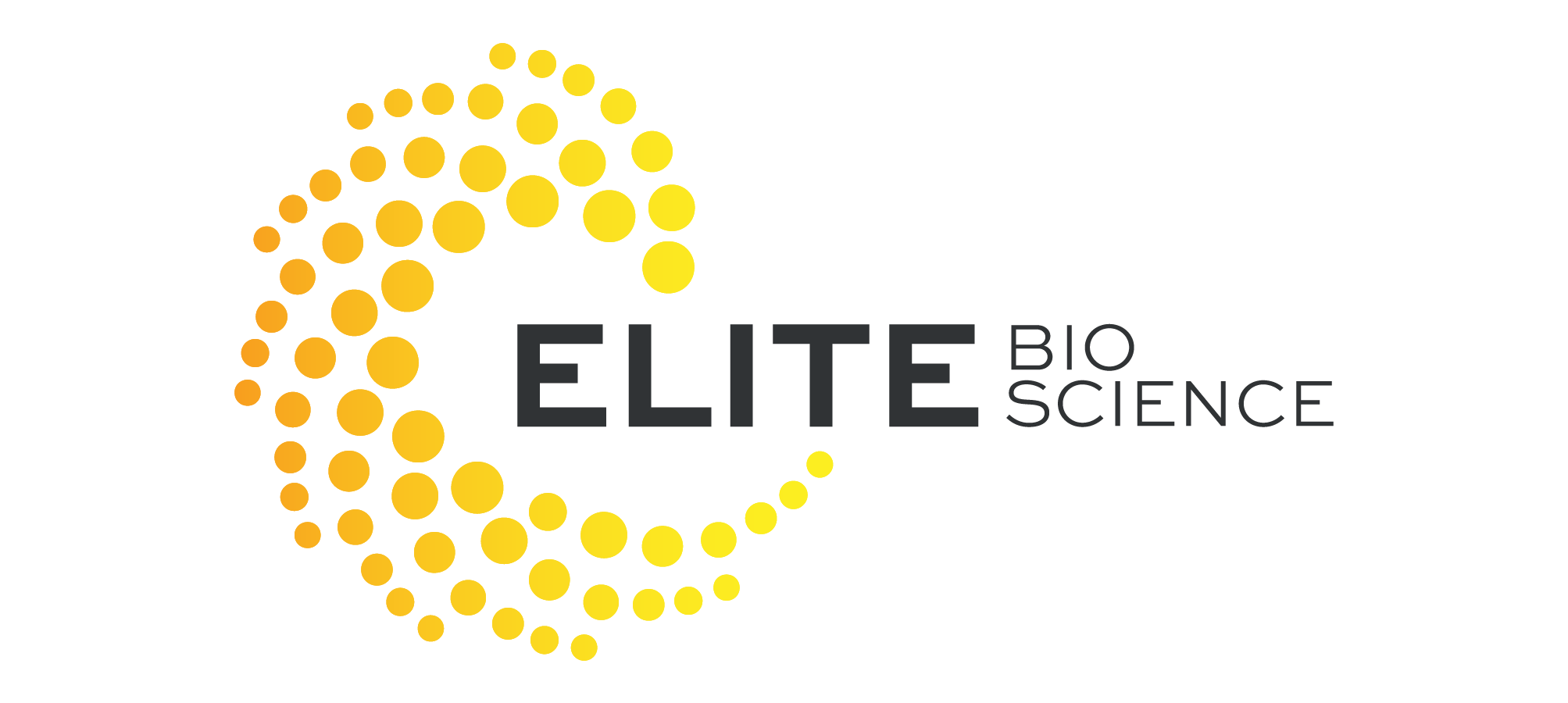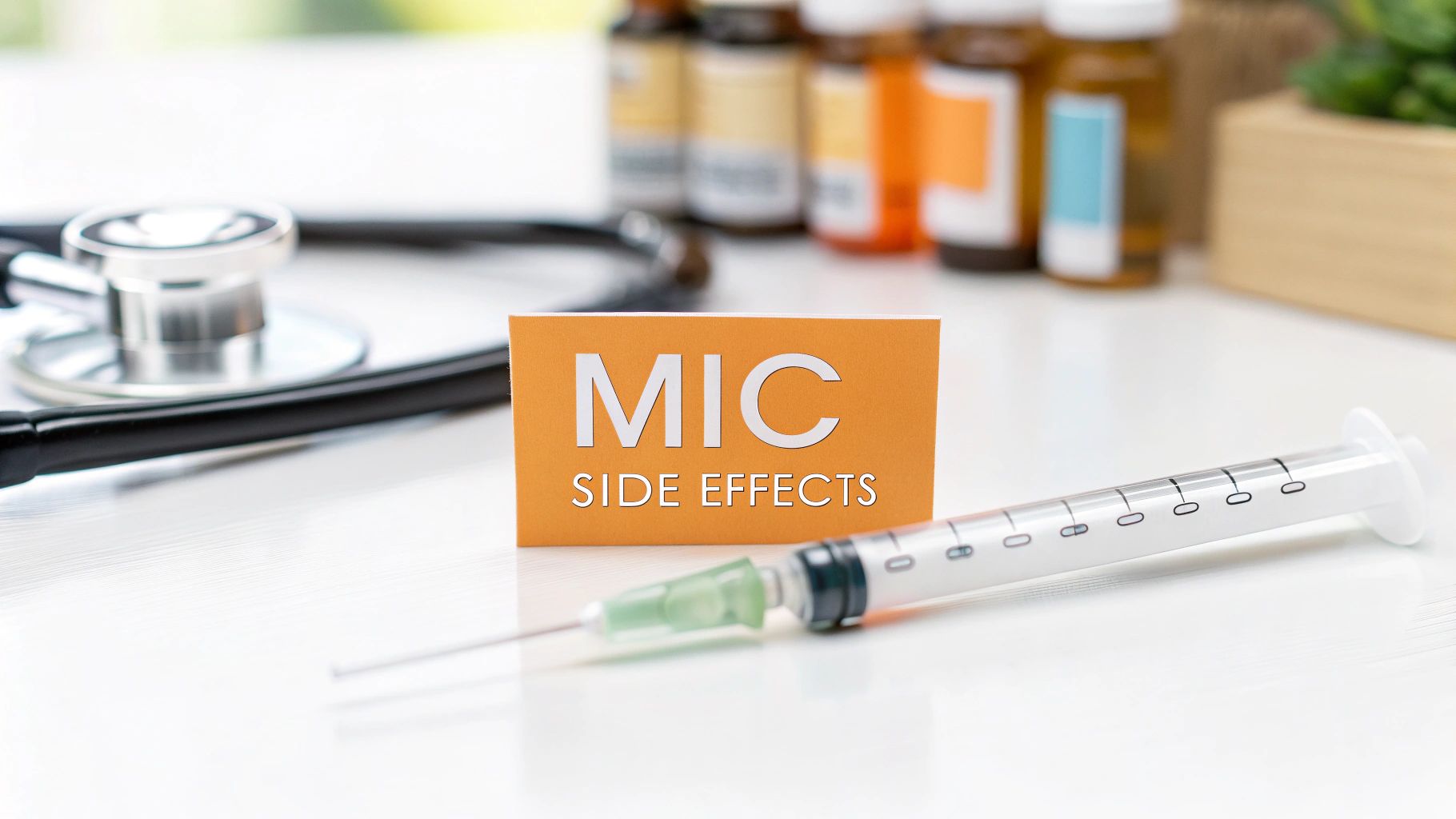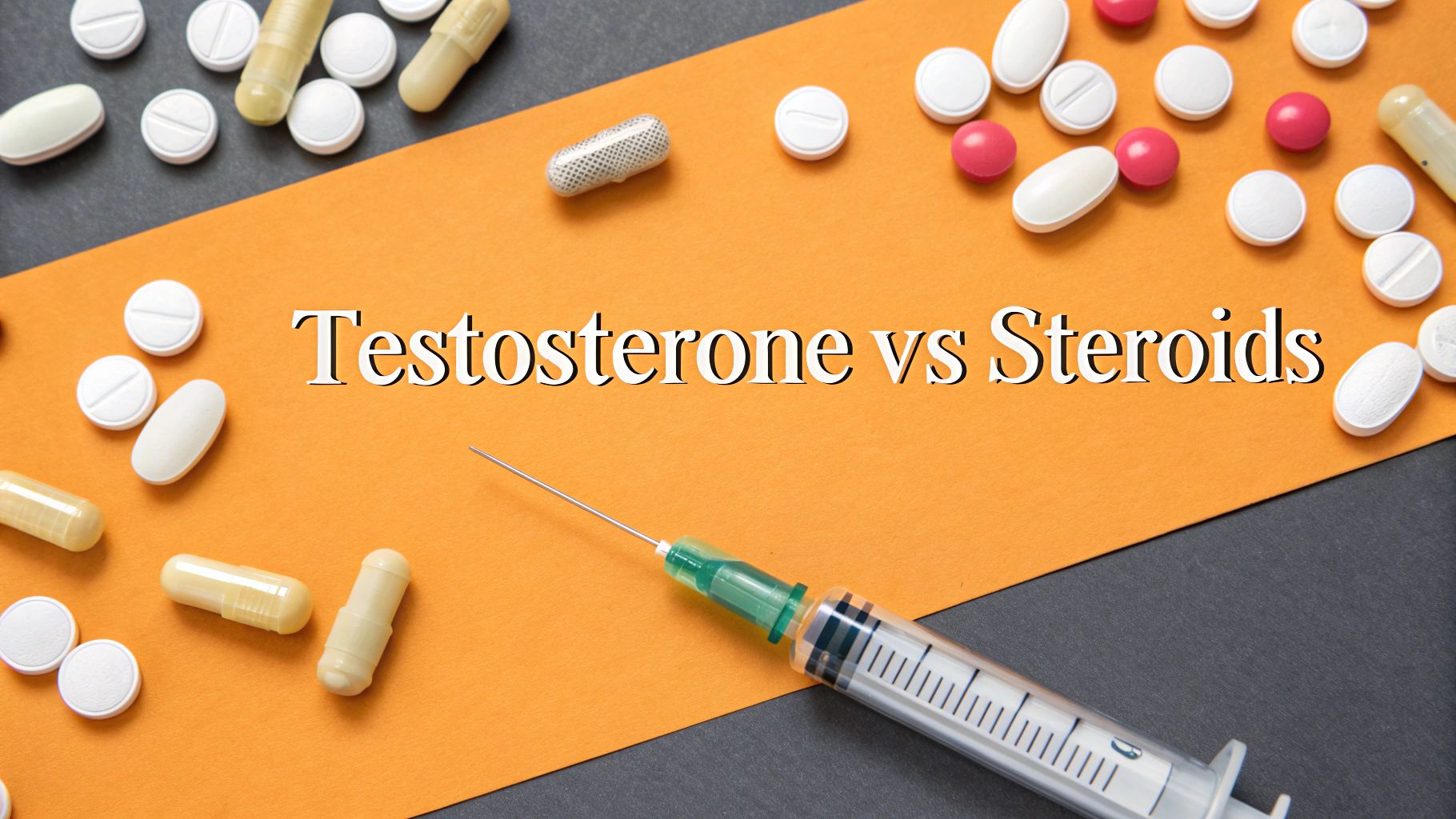Let's get straight to the point: there's no simple, one-size-fits-all price tag for peptide therapy.Think of it as a personalized investment in your health. On average, you can expect to put in anywhere from $250 to over $2,000 per month. That wide range reflects just how custom-tailored these powerful treatments really are.
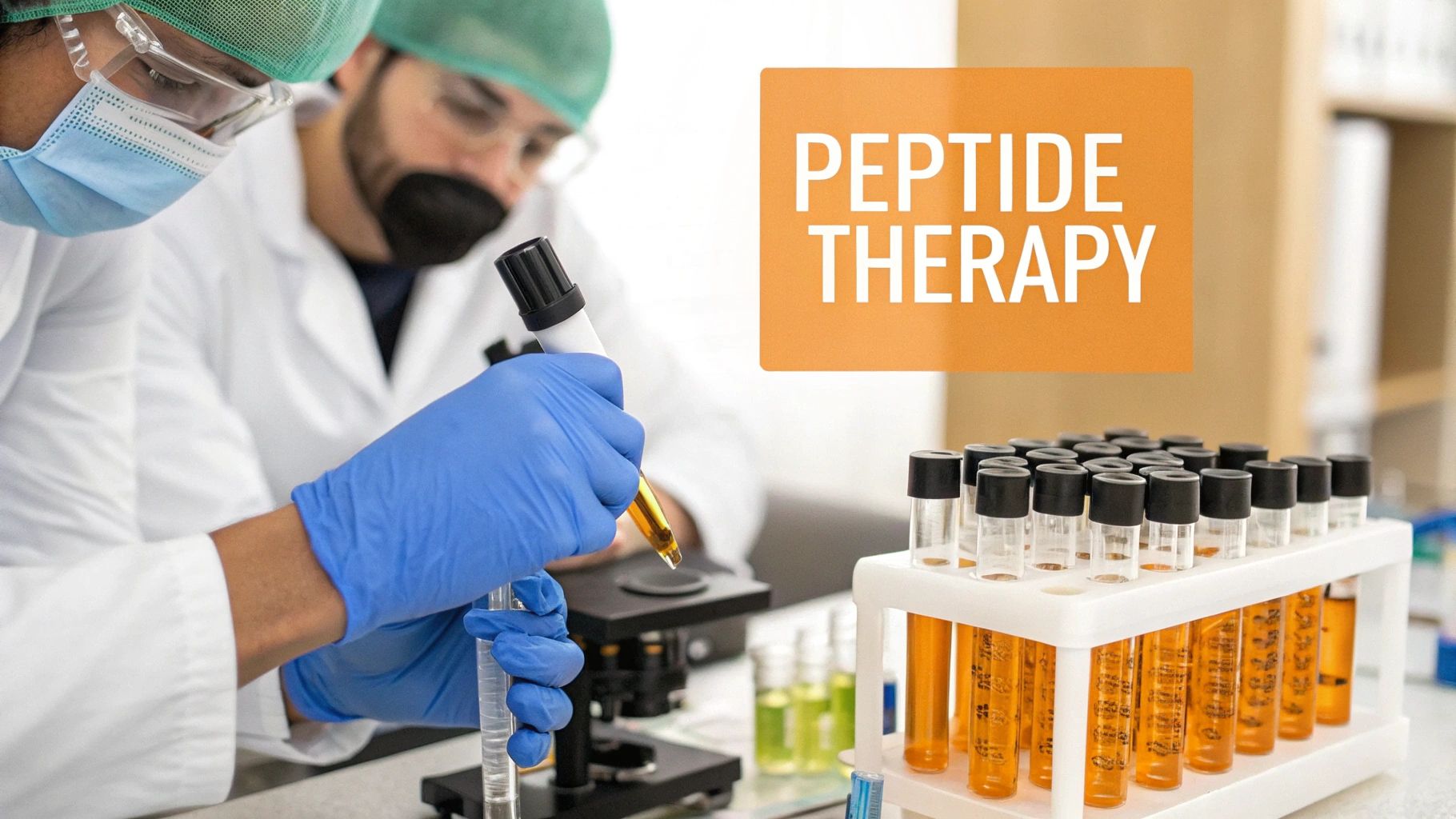
Understanding the Investment in Your Health
So, why the big price difference? It's like commissioning a custom suit versus buying one off the rack. The final cost depends entirely on the fabric (the specific peptides), the complexity of the design (your unique dosage and protocol), and the tailor’s expertise (your healthcare provider). Peptides aren't generic pills; they're sophisticated signaling molecules designed to give your cells specific instructions.
This personalized approach is exactly what makes them so effective for so many different health goals. Your unique biology, what you want to achieve, and your current health status will all determine which peptides you need and in what amounts.
What Are You Actually Paying For?
The monthly cost covers a lot more than just the vial of peptides. A legitimate, comprehensive program bundles several critical components that ensure your therapy is both safe and effective, and these elements directly influence the total price.
- The Peptide Formula: Different peptides have vastly different manufacturing costs and purposes. A common peptide for tissue repair like BPC-157 will have a much different price point than a more complex one for metabolic health, like Tirzepatide.
- Medical Oversight: Real peptide therapy requires a prescription from a licensed healthcare provider. This includes your initial consultations, analyzing your lab work, and monitoring your progress along the way. This guidance is non-negotiable for getting safe and effective results.
- Program Customization: Your protocol is built just for you. This means precise dosages, a specific injection schedule, and maybe even "stacking" multiple peptides to create a synergistic effect—all of which factor into the final cost.
This pricing structure is quite similar to other personalized treatments like hormone therapy. For anyone exploring related options, understanding the average cost of testosterone replacement therapy can offer some great context on how these custom medical protocols are priced.
The true value of peptide therapy isn't in the product, but in its precision. Instead of a shotgun approach, you're investing in targeted instructions for your body's cells, aiming for specific outcomes like faster recovery, a supercharged metabolism, or sharper cognitive function.
To give you a clearer idea of what this looks like, let's break down some typical monthly cost estimates for the most popular peptides. Just remember, these are ballpark figures. Your actual investment will be determined by a personalized consultation with a qualified provider.
Estimated Monthly Cost for Common Peptide Therapies
This table provides an at-a-glance look at the potential monthly cost for some of the most popular peptide treatments. Prices are estimates and can vary significantly.
| Peptide Type | Primary Use | Estimated Monthly Cost Range (USD) |
|---|---|---|
| BPC-157 | Injury recovery and gut health | $250 – $500 |
| CJC-1295/Ipamorelin | Growth hormone support and anti-aging | $400 – $700 |
| Semaglutide | Weight loss and metabolic health | $500 – $1,500+ |
| GHK-Cu | Skin rejuvenation and collagen production | $300 – $600 |
| Tirzepatide | Advanced weight loss and glycemic control | $800 – $2,000+ |
As you can see, the investment can range from a few hundred dollars for targeted repair to a couple of thousand for advanced metabolic treatments. The key is to work with a provider who can build a protocol that aligns with both your health goals and your budget.
The Key Factors Driving Your Peptide Therapy Cost
When you get a quote for peptide therapy, you’re not just paying for a vial of liquid. The total peptide therapy cost is a comprehensive figure, reflecting a medically supervised program with a lot of moving parts. Knowing what goes into that final number helps you see the real value behind the price tag and arms you with the right questions to ask.
Think of it like building a high-performance engine for your car. The price isn't for a single part; it's the sum of specialized components, expert labor, and the precise tuning needed to get an incredible result. In the same way, your therapy investment is made up of several critical elements all working together.
The Specific Peptide Formula
The first and biggest cost driver is the peptide itself. Let's be clear: not all peptides are created equal. Newer, more complex, or patented molecules often carry higher manufacturing and research costs, and that's reflected in their price.
For example, a well-established peptide like BPC-157, famous for its healing properties, will almost always be more affordable than a newer, highly sought-after metabolic peptide like Tirzepatide. The specific peptide or blend of peptides recommended for you is the foundational block the rest of the cost is built on.
Peptides can be broadly grouped by their main job in the body, and each category has its own general cost structure.
This infographic shows how peptide types branch out based on their target systems, from growth and hormone regulation to neurotransmitter support.
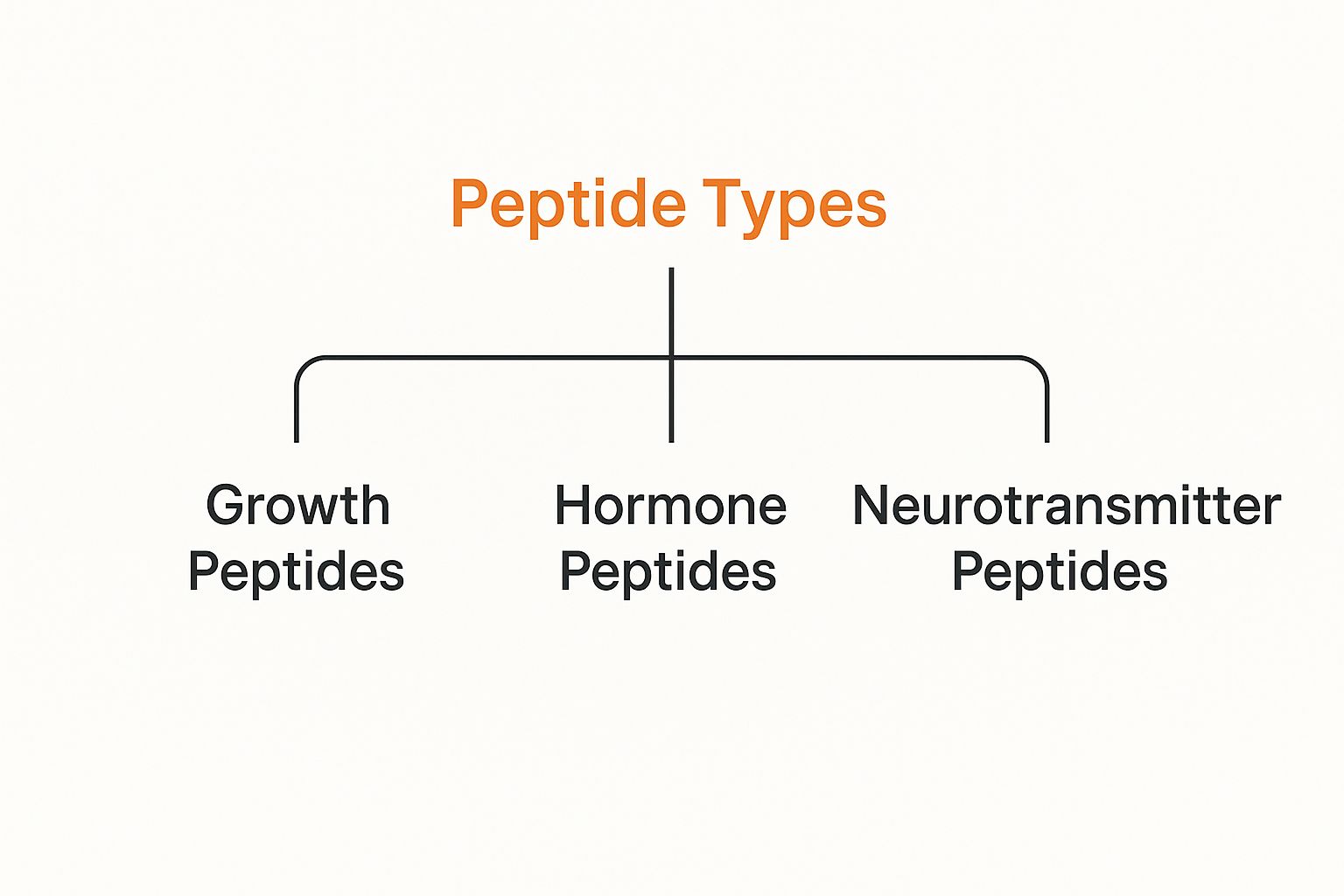
As the visual makes clear, your wellness goal—whether it's building muscle, balancing hormones, or sharpening your mind—directly points to the category of peptides you'll need, which in turn influences the final cost.
Your Personalized Protocol
Your treatment plan isn't a generic template; it's designed specifically for your body and your goals. This level of personalization directly impacts the total cost. The key variables in your protocol include:
- Dosage: The amount of peptide you need for each administration. Higher doses naturally mean a higher product cost over time.
- Frequency: How often you administer the peptide—daily, a few times a week, or on a different cycle—affects how fast you go through your supply.
- Peptide Stacking: Some protocols use multiple peptides at the same time to create a powerful synergistic effect. This "stacking" approach can be extremely effective, but it will also increase the total investment.
A protocol for aggressive weight loss will look very different—and have a different price tag—than one for subtle anti-aging or injury recovery.
Peptide Source and Quality
This factor is absolutely non-negotiable for both your safety and your results. The price you pay should reflect an unwavering commitment to quality. Legitimate peptide therapy relies on products sourced from a reputable, licensed compounding pharmacy. Period.
Sourcing peptides from unregulated online vendors to save a few bucks is a massive risk. These products often lack purity, contain harmful contaminants, or have the wrong dosages. You could get zero results at best or experience dangerous side effects at worst.
A trustworthy provider ensures that every single batch of peptides is third-party tested for purity, potency, and safety. This quality assurance is a crucial part of the peptide therapy cost and is there to protect your health.
Provider Expertise and Clinic Support
You aren’t just buying a product off a shelf; you're investing in expert medical guidance. A comprehensive peptide program includes the kind of ongoing support that's vital for safely reaching your goals. This support system usually covers:
- Initial Consultation: A deep dive into your medical history, symptoms, and goals with a licensed provider.
- Lab Work and Analysis: Essential blood tests to get a baseline and track your progress. This data-driven approach makes sure your protocol is working and safe.
- Follow-Up Appointments: Regular check-ins to tweak dosages, evaluate progress, and manage any potential side effects.
- Ongoing Support: Access to the clinical team for questions or concerns that pop up during your treatment.
This continuous medical oversight is what separates professional peptide therapy from risky, do-it-yourself approaches.
Program Duration and Commitment
Finally, the length of your therapy program shapes the total financial commitment. Some peptides are used for short-term goals, like recovering from an injury over a few months. Others, especially those for anti-aging or managing chronic conditions, might become part of a longer-term wellness strategy.
Most clinics will offer pricing structures that reflect different timelines, often with cost savings for longer commitments or package deals. Understanding the expected duration from the start helps you budget effectively and align the investment with your long-term health vision.
Comparing Costs for Different Wellness Goals
The real conversation about peptide therapy cost starts when you tie it directly to your goals. Looking at a generic price list isn't very helpful. It’s much more practical to frame the cost around what you're trying to achieve, whether that's shedding weight, turning back the clock, or recovering from an injury.

Think of it like this: you wouldn't use the same blueprint and materials to build a garden shed as you would a skyscraper. The same logic applies here. The peptides that support subtle anti-aging goals are completely different from those needed for significant muscle growth or a full metabolic reset.
Let's break down the common protocols and what you can realistically expect to invest for each of the most popular wellness goals. This approach helps you compare your options and match your budget to your desired outcome.
Weight Loss and Metabolic Health
This is easily one of the most popular reasons people explore peptide therapy. It's also an area where the investment can vary quite a bit depending on which peptide you choose. Protocols in this category are all about improving how your body handles insulin, curbing your appetite, and ramping up its natural fat-burning engine.
Peptides like Semaglutide and Tirzepatide are currently leading the pack, having gained massive attention for delivering some seriously impressive results. Because they are newer to the scene and highly effective, they also sit at the higher end of the cost spectrum.
Key Insight: For weight loss, the investment often scales with the peptide's power. While a cutting-edge option like Tirzepatide has a higher price tag, it might deliver more dramatic or faster results—a critical factor when you're weighing the total value of the treatment.
For a much deeper dive into how these compounds work, be sure to check out our comprehensive guide on peptide therapy for weight loss.
To give you a clear idea of how these popular weight management peptides stack up, we've put together a simple comparison.
Cost Comparison of Peptides for Weight Loss
This table breaks down the top peptides for weight loss, explaining how they work, the typical treatment plan, and what you can expect in terms of monthly cost.
| Peptide | How It Works | Typical Protocol | Estimated Monthly Cost |
|---|---|---|---|
| Semaglutide | Mimics a hormone that targets brain areas involved in appetite regulation and slows stomach emptying, making you feel fuller, longer. | Weekly subcutaneous injections, with the dose usually increased gradually over time. | $500 – $1,500+ |
| Tirzepatide | A dual-action peptide targeting two different receptors to regulate appetite and improve blood sugar control more powerfully. | Weekly subcutaneous injections, starting with a low dose that's adjusted based on patient response and tolerance. | $800 – $2,000+ |
As you can see, the choice often comes down to balancing the level of intervention you need with your budget.
Anti-Aging and Cellular Repair
For those focused on longevity and rejuvenation, peptide therapy takes a more foundational approach. These protocols are less about dramatic, immediate changes and more about improving cellular health, boosting collagen, and supporting the body's innate repair systems from the inside out.
Peptides in this category often work by gently stimulating your own growth hormone production or by providing the essential building blocks for tissue regeneration. This can translate into real-world benefits like firmer skin, deeper sleep, sharper mental clarity, and a general feeling of vitality.
Popular choices include:
- GHK-Cu: This copper peptide is famous for its skin-rejuvenating effects, promoting both collagen and elastin. It's used topically for targeted results or via injection for systemic anti-aging benefits.
- Epitalon: A synthetic peptide designed to regulate the pineal gland, it’s studied for its potential to protect telomeres and influence circadian rhythms—two key factors in how we age.
The monthly investment for most anti-aging protocols typically falls somewhere in the $300 to $600 range. The final cost will depend on whether you’re using a single peptide or a synergistic blend created for more comprehensive cellular support.
Muscle Growth and Injury Recovery
Athletes and anyone bouncing back from an injury often turn to peptide therapy to speed up healing and get an edge in their physical performance. These protocols are built to dial down inflammation, encourage new muscle growth, and fortify connective tissues.
Two of the most respected and effective peptides in this arena are CJC-1295 (often paired with Ipamorelin) and BPC-157. Each has a distinct job, but they work beautifully together.
CJC-1295 with Ipamorelin
This popular combination, often called a "stack," works by prompting your pituitary gland to release a steady, natural pulse of growth hormone. It’s a much more subtle approach than synthetic HGH, as it supports your body’s own production cycles, which is widely considered safer.
- Primary Benefits: Increased lean muscle mass, fat loss, faster recovery times, and improved sleep quality.
- Typical Monthly Cost:$400 – $700
BPC-157
Nicknamed the "Wolverine" peptide for a reason, BPC-157 is a true powerhouse for healing. It's a stable gastric peptide that shows incredible systemic effects on repairing tendons, ligaments, muscles, and even the gut lining.
- Primary Benefits: Dramatically accelerated recovery from sprains, tears, and other injuries; reduced inflammation; and better gut health.
- Typical Monthly Cost:$250 – $500
By breaking down the peptide therapy cost according to your ultimate goal, it becomes much easier to see which protocols are right for you and what a reasonable budget looks like to get there.
Navigating Insurance and Payment Options
It’s the first question on everyone’s mind with any wellness investment: "Will my insurance cover this?" When it comes to the peptide therapy cost, the answer is usually straightforward, though it might not be what you’re hoping to hear.
Most peptide protocols designed for wellness, anti-aging, or performance are considered elective, meaning they are rarely covered by standard insurance plans. Insurance companies typically only pay for treatments they deem “medically necessary” for a diagnosed disease. A protocol to boost your energy or speed up workout recovery, while incredibly valuable to you, just doesn't fit into their strict definition.
Of course, there are rare exceptions. If a specific peptide has received FDA approval for a specific medical condition and you have that official diagnosis, coverage becomes a real possibility. But for most people seeking wellness optimization, this scenario doesn't apply.
Creative Ways to Fund Your Therapy
Just because insurance likely won't foot the bill doesn't mean you're out of options. Many people find smart ways to use pre-tax accounts to make their therapy much more affordable. These are powerful tools designed specifically for qualified medical expenses.
- Health Savings Account (HSA): If you have a high-deductible health plan, you can contribute pre-tax dollars to an HSA. You can then use these funds for your peptide therapy, which effectively gives you a discount equal to your income tax rate.
- Flexible Spending Account (FSA): Many employers offer an FSA, which also lets you set aside pre-tax money for healthcare costs. It’s a fantastic way to budget for your treatment throughout the year.
Using an HSA or FSA can slice 20-30% off your total out-of-pocket peptide therapy cost, depending on your tax bracket. It’s always a good idea to double-check that your specific therapy qualifies under your plan's rules.
Exploring Clinic Payment Plans
Beyond personal savings accounts, most reputable clinics understand that peptide therapy is a significant investment. They often provide payment solutions to make it more accessible, allowing you to start your program without having to pay the entire cost upfront.
Many providers offer in-house payment plans that split the total cost into manageable monthly installments. Others partner with third-party medical financing companies that offer low or zero-interest promotional periods.
These options transform a large one-time investment into predictable monthly payments that are much easier to fit into your budget. For those considering this path, exploring options for peptide therapy online can introduce you to clinics that specialize in flexible payment structures and remote care.
Don’t hesitate to ask a clinic about their financing options—it’s a standard and smart part of the consultation process. A good provider wants to find a solution that works for both your health goals and your financial reality, ensuring you can commit to your protocol with confidence and peace of mind.
How Market Growth Could Impact Future Pricing
Peptide therapy isn't just some fleeting wellness trend; it's a serious, multi-billion dollar market that's absolutely exploding. If you're considering this treatment, understanding these market dynamics is the key to figuring out how the peptide therapy cost might shift in the years ahead. It really boils down to two powerful, opposing forces pulling prices in different directions.

On one hand, you have massive investments from major pharmaceutical companies. This money is pouring into research and development, leading to breakthrough new peptides that are often patented and highly effective. This kind of innovation pushes the market forward, but it almost always comes with a premium price tag for those who want the latest and greatest.
At the same time, a second force is at play. As foundational peptides become more established and their patents expire, more companies can start producing them. This flood of competition, along with more efficient manufacturing, begins to push their prices down, making older—but still very effective—peptides more affordable over time.
The Innovation Premium
The incredible therapeutic potential of peptides has definitely caught the eye of the pharmaceutical giants. This flood of capital is speeding up the journey from a discovery in the lab to a treatment you can actually get at a clinic, bringing powerful new therapies to market faster than ever before. But all that money spent on research, clinical trials, and getting FDA approval for new peptide drugs? That cost inevitably gets passed on to you, the consumer.
For instance, a new, game-changing peptide for metabolic health will almost certainly launch with a high initial price tag. This helps the manufacturer start to recoup its huge R&D investment. This "innovation premium" is a standard part of the pharmaceutical world.
The global peptide therapeutics market was valued at an astonishing USD 117.26 billion and is projected to skyrocket to USD 260.25 billion by 2030. This rapid expansion, with giants like Pfizer and Eli Lilly investing heavily, points to a future filled with more advanced but potentially pricier options. You can explore the full market analysis and its implications for future costs.
Competition and Accessibility
While brand-new discoveries might drive some prices up, the other side of the market offers a nice balancing act. As older, widely used peptides come off-patent, other manufacturers are free to start producing them. This creates a much more competitive marketplace, which nearly always works out in the consumer's favor.
Think about the factors that can drive down the cost of these established peptides:
- Increased Supply: More manufacturers jumping into the market leads to a greater supply of a peptide, which naturally puts downward pressure on its price.
- Manufacturing Efficiency: As production methods are perfected over the years, the cost to actually synthesize these complex molecules drops.
- Generic Availability: The moment a generic version of a once-patented peptide hits the market, the price can plummet, making it accessible to a much wider audience.
What this all means is that while the absolute cutting-edge of peptide therapy might stay expensive, the foundational treatments that have already proven their worth are likely to become more and more affordable. Understanding this dual-natured market—innovation driving some prices up while competition drives others down—gives you a much smarter perspective on the long-term value and future peptide therapy cost.
After breaking down all the numbers and variables, the real question isn't just "What does peptide therapy cost?" It’s about something much more personal: "What is the return on this investment for my life?" To get to the heart of it, you have to look past the price tag and start thinking of this as a strategic investment in your future self and your day-to-day quality of life.
The decision really comes down to weighing the financial cost against the potential life-changing rewards. Are you looking to get back the energy to keep up with your kids or grandkids? Or maybe you need sharper focus to excel in your career, or a healthier body that makes you feel confident again. For some, it's about finally getting relief from that nagging injury that keeps them on the sidelines.
Valuing the Intangible Returns
The true value of peptide therapy isn't found in the vial; it's in the life you get back. It’s about putting a number on what it's worth to you to wake up feeling genuinely rested, move without that familiar ache, or stay mentally sharp and engaged all day long. These are the real-world returns that a well-designed peptide protocol is meant to deliver.
To make a smart choice, get specific about your health ambitions. What, exactly, are you hoping to achieve? Putting a personal value on those goals is the first step in deciding if the cost is truly worth it for you.
The most important takeaway is that value is completely subjective. For one person, a $600 monthly investment that gets rid of chronic joint pain and gives them back their mobility is an absolute bargain. For someone else, that same cost for subtle anti-aging benefits might not feel nearly as compelling.
Understanding this personal "return on investment" is everything. The cost is a fixed number, but the value is deeply personal and tied directly to what you want to accomplish for your health.
A Practical Checklist for Your Decision
Before you jump in, it’s smart to walk through a few final considerations. This simple checklist can help you make sure the decision fits both your wellness goals and your financial reality, bringing some much-needed clarity to the choice.
- Define Your "Why": Get crystal clear on what you hope to achieve. Is it peak performance, faster recovery, long-term health, or weight management? A specific goal makes it much easier to know if the therapy is working.
- Confirm the Quality: Never, ever compromise on the source of your peptides. Make sure your provider uses a reputable, licensed compounding pharmacy that performs third-party testing. For both safety and results, quality is non-negotiable.
- Understand the Full Picture: Remember that the price includes more than just the product—it covers medical oversight, lab work, and personalized support. This comprehensive care is what makes the journey safe and effective.
- Assess Your Budget: Take an honest look at what you can comfortably afford over the long term. Consistency is what delivers the best results, so it's best to choose a protocol you can stick with without adding financial stress.
Ultimately, the decision to invest in peptide therapy is yours alone. But by understanding that the cost can vary, that quality is king, and that your personal "why" is what gives the price meaning, you can move forward. This knowledge gives you the power to make a confident choice—an investment in your health made with both purpose and clarity.
Common Questions About Peptide Therapy Costs
Even after seeing a price list, it’s completely normal to have more questions about the financial side of peptide therapy. Trying to understand peptide therapy cost can feel a bit like navigating a maze, but getting straight answers is the best way to make a decision you feel good about.
This section tackles some of the most common concerns head-on, with direct, no-nonsense answers to give you the clarity you need.
Why Do Prices Vary So Much Between Clinics?
You might get a quote from one clinic that seems wildly different from another, and there’s usually a very good reason for it. The big swings in peptide therapy cost aren't random; they reflect major differences in the quality of care and the depth of the program you’re signing up for.
It helps to think of it less like buying a product off a shelf and more like investing in a comprehensive medical service.
Several key factors drive these price differences:
- Provider Expertise: A clinic run by a board-certified physician specializing in functional or regenerative medicine will have a different cost than a general wellness center. You're paying for years of deep knowledge needed to design a protocol that is not only effective but, most importantly, safe and personalized to you.
- Program Support: Is the clinic just handing you a prescription and sending you on your way, or are they providing a full-support program? A higher price often includes ongoing consultations, progress tracking, direct access to a medical team for questions, and crucial adjustments to your protocol. This hands-on guidance is often what separates success from failure.
- Peptide Quality: This is the big one and it’s non-negotiable. Reputable clinics source their peptides exclusively from licensed, PCAB-accredited compounding pharmacies. These pharmacies perform rigorous third-party testing to verify purity and potency. Lower-cost providers might cut corners here, which is a massive red flag for both your safety and your results.
Can I Save Money Buying Peptides Online?
The short answer is yes, you can find substances labeled as "peptides" online for a fraction of the price. But the risks are enormous and far outweigh any money you might save. Unregulated online vendors are notorious for selling products that are impure, under-dosed, contaminated with harmful substances, or simply not what they claim to be at all.
This is a critical safety issue. Administering a substance from an unverified source is a gamble with your health. Without medical guidance, you have no way of knowing the correct dosage or how to manage potential side effects, turning a therapeutic tool into a potential danger.
A legitimate peptide therapy cost from a medical clinic includes three things you can't get online: a valid prescription, ongoing medical supervision, and guaranteed product quality. These are the safety nets that are completely missing when you buy from an unregulated source.
What Are the Typical Upfront Costs?
Before you start any therapy, your provider needs a crystal-clear picture of your current health. This means some initial diagnostic fees are part of the startup cost, but they are absolutely essential for creating a safe and effective treatment plan that is built just for you.
This upfront investment usually covers two main things:
- Initial Consultation: This is an in-depth session with your healthcare provider to go over your medical history, talk through your symptoms, and nail down your health goals. This can range from $150 to $400, depending on the provider's expertise and how long the consultation is.
- Comprehensive Lab Work: Blood tests are the only way to get an accurate snapshot of your hormone levels, key biomarkers, and overall health. The price for this initial lab panel can run from $200 to $500 or more, depending on the specific tests your protocol requires.
These initial fees are what allow your therapy to be tailored specifically to your unique biology right from day one.
Ready to invest in yourself with a safe, effective, and medically supervised program? At Elite Bioscience, we provide transparent pricing and expert guidance to help you achieve your health goals with confidence. Explore our personalized peptide therapy programs today.
